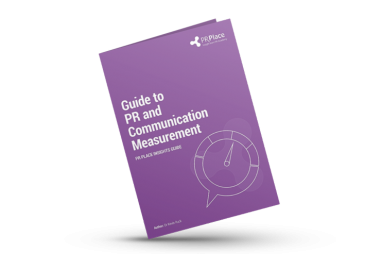This week in PR (19 April)

About the author
Richard Bailey Hon FCIPR is editor of PR Academy's PR Place Insights. He teaches and assesses undergraduate, postgraduate and professional students.

Profession and ethics
- Stephen Waddington: Renewal (18 April)
‘Renewal will be crowdsourced from across the public relations industry and we’d welcome your contribution. It will be based on a series of essays of 800-1,200 words in length. Contributions should be thought-provoking and inspirational.’
Purpose, climate and ESG
SUSTAINABILITY COMMUNICATION DIPLOMA
- Andy Payne and Tom Lawless: What you need to know about Climate Transition Plans (18 April)
‘Businesses have done well to get to grips with the acronym soup of sustainability frameworks and disclosure rules, but one of them – Transition Planning – is still relatively unknown despite its increasing importance.’ - Andrew Adie: Azerbaijan kicks off COP29 agenda (16 April)
‘Action on accelerating the transition to green energy and climate finance will be among the key themes for COP29, confirmed yesterday in the first press conference from Azerbaijan, which holds the COP29 Presidency.’
Consulting, skills and careers
- Anita Rathod: Embracing the quiet strength (no date)
‘As an introverted woman of Indian heritage, navigating my path to leadership has been a journey of learning. Through practice, I’ve learned to adapt my style, pushing myself to learn extrovert traits to be a better leader – challenging the negative misconceptions of introversion.’
Gender, diversity, health and wellbeing
- Cherná Lutta: The Cusp Generation should matter in PR (no date)
‘Combined Gen Zs and Zillenials are the largest generation in the workforce with the largest cohort of managers among them, so their significance to brands cannot be shrugged off.’ - Nastacha de Avila: How to make sure your digital marketing campaign is accessible to all (16 April)
‘Compliance with regional accessibility standards, such as those outlined by W3C and WCAG, not only helps avoid legal issues and potential lawsuits but also establishes a commitment to inclusivity.’
Public and third sectors
- Anuji Evans: How an NHS Trust harnessed video through telling people stories (13 April)
‘Content to us is about spotting an opportunity to tell a story and seizing it. We’ve been doing that for a while now, just in different forms so that we continue to move with the times.’
Politics, public affairs and public sphere
- Emily Sharp: Creating the UK’s first smoke-free generation (16 April)
‘There are a range of supporters for the policy, from a majority of doctors, nurses and health charities, a substantial majority of the public, and governments of all four UK nations. While Labour and the Lib Dems are supportive, the Conservatives are split.’
Thought leadership
- Gini Dietrich: Unlocking the Essence of True Thought Leadership (18 April)
‘Thought leadership expresses ideas demonstrating expertise in a particular field, area, or topic. A thought leader is typically known for their unique point of view and the ability to inspire others to think differently. And because they demonstrate experience and expertise, they create authority and trust.’ - Katie Macaulay with Chris Ducker: How to build a personal brand [podcast] (17 April)
‘At the core of a personal brand, it’s your reputation. Your personal brand is what people say about you when you’re not around. What are you known for?’ -
Tony Jaques: True thought leader don’t just make noise: They drive change. (17 April)
‘Thought leaders need to have original thoughts, not simply churn out corporate messaging and industry clichés. We certainly know what thought leadership isn’t. It’s not the CEO talking endlessly about their own organisation.’ - Paul MacKenzie-Cummins: Why generative AI will always be on the losing side in the war with human-written content creators (17 April)
‘Thought leadership is exactly what it says it is—the ‘thoughts’ of ‘leaders’ and other senior figures. So, until generative AI can access your brain to extrapolate the wisdom inside your head, the content that such platforms produce simply cannot possibly be considered ‘thought leadership.’ It is content, yes. But it’s not thought leadership content.’
Research, data, measurement and evaluation
- Jason Weekes: Data and diamonds: Unveiling the PR award formula (16 April)
‘Once armed with data, it’s time to weave it into a compelling narrative. Your award submission should read like a captivating story, showcasing the journey and impact of your campaign. Use real-time analytics and PR measurement dashboards to provide dynamic insights, emphasising the immediate and lasting effects of your strategy and tactics.’
Crisis, risk and reputation
Internal communication
INTERNAL COMMUNICATION DIPLOMA
- Jenni Field: The latest research into the internal communication profession (18 April)
‘The majority of [internal communication] people (34%) report to Corporate Communications and 26% report into HR.’
- Rachel Miller: Podcast: How to lead internal communication and set standards (12 April)
‘An internal communication team sets the communication standards for the rest of the organisation. You are the subject matter experts and you determine what excellent internal communication looks like. You are the centre of excellence.’
Media, digital and technology
- Ruby Tyson: The SEC Newgate AI Weekly (18 April)
‘If AI expert Nina Schick’s prediction is correct, within a few years 90% of all online content could be generated by AI.’ - Fi Todd: #ConsumerCorner: Would a TikTok ban kill travel Marketing? (16 April)
‘If a TikTok ban did come into force, we’d likely see disruption across the entire global travel landscape – not just in the US.’


